SC Barred Magistrate From Taking Cognizance Of FIR Against Professor Ali Khan Mahmudabad
National NationalPosted by AI on 2025-08-25 10:20:50 | Last Updated by AI on 2025-08-25 17:22:59
Share: Facebook | Twitter | Whatsapp | Linkedin Visits: 0

India's top court intervening to halt enquiries against Professor Ali Khan Mahmudabad highlights the increasing conflict between free speech and democracy in the country.
The recent top court intervention to support a professor's freedom of expression regarding the Operation Sindoor incident in Gaya illustrates the growing conflict between free speech and democracy in India. The case of Professor Ali Khan Mahmudabad, who was charged with filing a First Information Report for his social media posts on Operation Sindoor, highlights the dilemma.
The professor expressed on Twitter that the operation, in which Hindu activists were allegedly caught planting saffron flags at a Muslim cemetery, was a 'heinous crime.' However, the local police in Gaya claimed that the professor's Twitter statement intended to cause religious disharmony.
The Supreme Court's order to halt the district magistrate from taking any further action on the FIR against Mahmudabad sends a crucial message to support free speech in the country. The court argued that the tweets did not contain any calls for violence or incitement to cause a riot, and the law enforcement's move to prosecute Mahmudabad set a dangerous precedent regarding academic and political freedom of speech in India.
This case's attention highlights the tension between upholding democratic values and preserving religious harmony, a challenging tightrope to walk for any society, especially ones as diverse as India.
Search
Categories
- Sports
- Business
- History
- Politics
- International
- Science & Technology
- Social Issues
- Disaster Management
- Current Affairs
- Education
- Startup Business
- Startup News
- Awards
- Community Services
- Fundraising Events
- Volunteer Services
- Health Initiatives
- Innovations and Initiatives
- In News
- Banners
- Awards
- Partners
- Products
- Press Releases
- News
- Fast Check
- South
- సినిమా
- Gallery
- Sunday Chronicle
- Hyderabad Chronicle
- లైఫ్ స్టైల్
- National
- క్రైం
- ట్రెండింగ్
- జాబ్స్
- అంతర్జాతీయo
- బిజినెస్
- రాజకీయం
- బిజినెస్
- సంపాదకీయం
- నవ్య
- చిత్ర జ్యోతి
- క్రీడలు
- జాతీయం
- తెలంగాణ
- తాజా వార్తలు
- మన పార్టీ
- మన నాయకత్వం
- మన విజయాలు
- డౌన్లోడ్స్
- మీడియా వనరులు
- కార్యకర్తలు
- North East Skill Center News
- Government Schemes
- Entrepreneurship Support
- Employment Opportunities
- Skill Training Programs
- Departments
- Investments
- Initiatives
- Resources
- Telangana IT Parks
- Events & Jobs
- Press Releases
- News
- Airport News
- Newtons Laws of Motion
- Karbonn in Business
- Investments in Karbonn
- Company quarterly sales
- Markets
- Auto News
- Industry
- Money
- Advertisements
- Stock target
- Company Updates
- Stock Market
- Company Sales
- Staffing and HR
- Constituency Assembly
- General News
- Srikalahasti Temple
- Bojjala Sudhir Reddy
- Technology & Innovation
- Sports
- Business
- Products
- Industries
- Services & Trainings
- Tools & Resources
- Technology Integration
- Drug Seizures & Arrests
- Telangana Narcotics
- Law & Enforcement
- Rehabilitation
- Nationwide Drug Policing
- Nigeria Seizures
- Global Operations
- Drug Awareness
- Drug Enforcement Tech
- NCB Drug Seizures
- Judicial Crackdown
- India's Surveillance Tools
- Cross-Border Links
- Women Safety
- Cyber Crimes
- Drug Abuse
- Traffic & Road Safety
- Community Connect
- Public Safety Alerts
- Citizen Assistance
- Nellore City News
- Politics & Administration
- Events & Festivals
- Agriculture & Rural
- Business & Economy
- Health & Wellness
Recent News
- India's Success in the UN Elections ConfirmsCredibility of 'Actionable Conclusions'
- Case papers destroyed in fire: Court allows NCB to present copies of original documents
- Supreme Court Forces Indian Government to Stop Clinical Trials of 162 Drugs
- Problem With Drug Seizures Spurs Calcutta High Court to Allow Charge Sheets Without Chem Reports
- Nagpur Crime Branch Crushes Drug Ring, Seizes 1kg Ganja
- Smuggling syndicate involves senior army officers: MACC
- Punjab's Narcotic Problem
- # Eyes in the Sky: Drastic Increase in Drone Activity near LoC